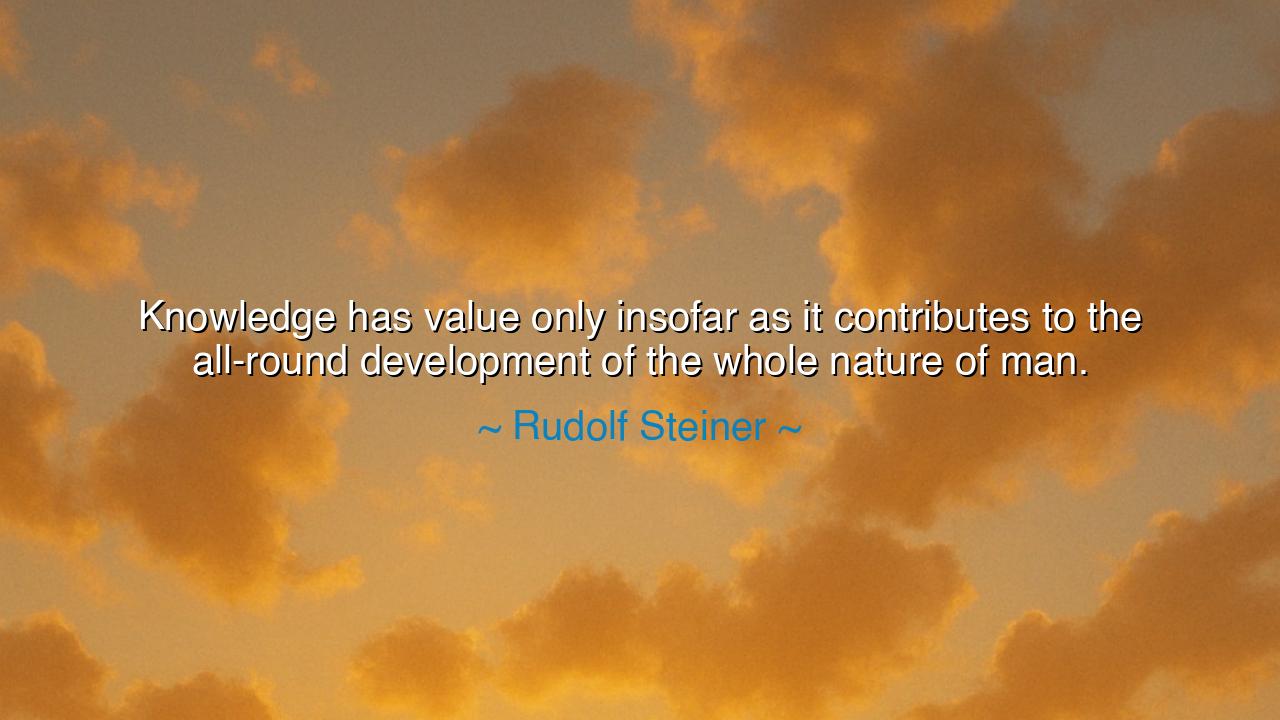
Knowledge has value only insofar as it contributes to the
Knowledge has value only insofar as it contributes to the all-round development of the whole nature of man.






In the words of Rudolf Steiner: “Knowledge has value only insofar as it contributes to the all-round development of the whole nature of man.” These words strike with the force of a timeless truth, for they remind us that knowledge is not an idol to be worshiped for its own sake, nor a trophy to be hoarded in pride. It is a living force, and its true worth lies in how it transforms the human being—not in fragments, but in wholeness. For what is the use of a brilliant mind if the heart is barren? What is the worth of facts and formulas if they do not awaken compassion, creativity, and strength of spirit?
The ancients understood this union of the mind and the soul. In Greece, the ideal of paideia was not only the training of intellect but the shaping of character, the harmonizing of body, spirit, and thought into a noble human being. Likewise, in the East, Confucius taught that the cultivation of wisdom must always walk hand in hand with virtue, for a clever man without goodness could become a danger to society. Thus, Steiner’s words echo the chorus of civilizations: that knowledge finds its highest value when it serves the development of the whole person.
Consider the story of Leonardo da Vinci. His brilliance in art, science, and invention was not confined to isolated fields. He embodied the Renaissance ideal, where knowledge in mathematics fed into his painting, where study of anatomy enriched his art, where observation of nature inspired machines. His genius was not fragmented but whole, and because of this, he advanced not only human skill but the very idea of what it means to be human. His life demonstrates the truth that knowledge attains its greatest value when it nurtures every aspect of man’s nature—mind, imagination, and spirit alike.
By contrast, history warns us of the peril of partial growth. In the twentieth century, regimes arose that wielded vast knowledge of science and industry, yet lacked moral development. The result was destruction on a scale previously unimagined—factories of war, weapons of terror, atrocities rationalized by clever reasoning. Here we see what Steiner cautions against: when knowledge is divorced from the higher nature of man, it becomes a weapon against humanity itself rather than a tool for its uplift.
Thus, the origin of Steiner’s teaching lies in his philosophy of education, where he sought to form children not merely into repositories of information, but into free, creative, and compassionate beings. The purpose of education, he insisted, was to nourish imagination, discipline, feeling, and thought in harmony, so that the child might grow into a whole human being. In his vision, knowledge is not an end but a means—a river whose purpose is to irrigate the soil of the soul, that it may bear fruit for the good of all.
The lesson for us is clear: let us not measure our worth by what we know, but by what our knowledge makes of us. Seek learning that strengthens your heart as well as your mind, that deepens your compassion as well as your reasoning, that teaches you how to live and not only how to succeed. When you read, when you study, when you labor to understand, ask always: How does this help me grow as a whole being? How does it shape my character, my creativity, my service to others? Only then does knowledge become true wisdom.
Therefore, O listener, take these words into your life: pursue knowledge, but do not stop at accumulation. Let it refine your thoughts, ennoble your feelings, and strengthen your will. Let it contribute to the development of your whole nature, so that you may live as a balanced soul—one who not only knows, but also loves, creates, and uplifts. For this is the true purpose of learning: not the cold possession of facts, but the warm flowering of the human spirit into its fullness.






AAdministratorAdministrator
Welcome, honored guests. Please leave a comment, we will respond soon